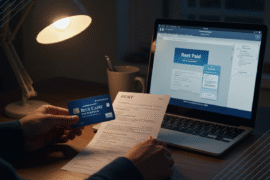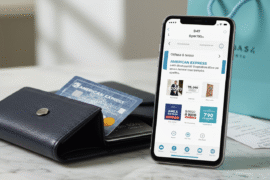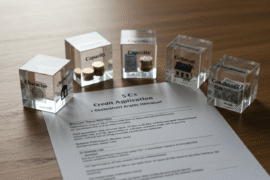This article may contain references to products or services from one or more of our advertisers or partners. We may receive compensation when you click on links to those products or services. Nonetheless, our opinions are our own.
The information presented in this article is accurate to the best of our knowledge at the time of publication. However, information is subject to change, and no guarantees are made about the continued accuracy or completeness of this content after its publication date.

Updated by Albert Fang
Staying in tune with your credit score is essential. This number dictates what you can and cannot do financially and creates a virtual barrier to acquiring lines of credit for buying a house or a car. Credit files are public information which means, anyone who puts in a request can view the information held in your name. Therefore, if you don’t have access, it’s time to change that. Read below for five ways you can boost your credit score if it is not where you need it to be.
Why You Might Have a Low Score
When it comes to credit scores, the higher the number, the better. Ideally, the marker should be in the green zone which indicates a good rating, as opposed to the red or amber which is poor. Your score might be lower than it should be if you have:
- A lot of debt
- A history of missed payments
- A maxed-out credit allowance, or
- Multiple recent applications for funding
Fortunately, improving your rating is a straightforward process. Here is how you do it.
Keep Up with Repayments
The biggest downfall of people with initially good credit is missed payments or becoming overwhelmed with credit commitments. One way to avoid this is by using a monthly bill tracker, as explained further in the linked article from Tally. Tally, aside from their expert advice on all things financial, is an app that people can use to customize monthly payments on their credit card debt and similar. Staying on top of repayments with a monthly bill tracker is a large part of building your credit score and if you continue to neglect this aspect of your financial activity, you will never be able to move out of the red.
Voted "Best Overall Budgeting App" by Forbes and WSJ
Monarch Money helps you budget, track spending, set goals, and plan your financial future—all in one app.
Get 50% OFF your first year with code MONARCHVIP
Get on the Electoral Roll
When you enter your details onto the electoral roll, you are providing companies with a way to confirm your identity. This immediately improves your credit score as it proves you are a real person and all your details are what you say they are, which in turn combats fraudulent applications and crimes such as identity theft. Any credible credit company will require a stringent identity check and proof of residence, age, and birthplace. Your presence on the electoral roll is simply further proof of this and makes the process a whole lot easier.
Get a Credit Card
No, this is not a contradiction! Getting a credit card, especially when you have no other lines of credit open, really does help to build credit when managed correctly. There are certain rules to follow if you want to boost your score instead of seeing it drop. Firstly, never borrow outside of your budget. Anything that you spend on that credit card, you are accountable for and have to pay back. Two, use it wisely and try to avoid taking out more than one. Meet at least the minimum payment, preferably the whole balance where possible. Thirdly, use it as a building tool rather than an expense account. Set a strict boundary with yourself that fits within your means, and do not stray from the path. Other things that are not credit cards that can help your score grow include taking out a mobile phone contract or leasing a car.
Don’t Make Too Many Credit Applications
When you apply for credit, the lender takes a look at the whole picture. If they see that you have applied for multiple lines of credit in a short space of time and had a similar amount of rejections, they will definitely reject your application as well. This is because you look almost desperate to secure funding, which then makes you a risk and an undesirable client in the eyes of the lender. Not only this, but every time you apply, the finance provider will perform a hard search on your credit file, which also has a detrimental effect on your score each time it happens. This is opposed to a soft search, which does not affect your score at all.
Check Your Credit Report
Last but not least, check your credit report! Sign up to any of the well-reviewed credit file agencies and provide your personal details to gain access to your financial profile. This is the only guaranteed way that you can keep up with what you owe, where you owe it too, and be able to take a look at the bigger picture to enforce a change in habits where necessary. Lots of these services are free, but some do charge a monthly fee for access. These tend to be more detailed than the free accounts.
It is often overwhelming to engage in financial conversations. Money is not talked about enough, but that is not a reason to disengage. Signing up to view your credit file and keeping on top of your monthly financial commitments are the best places to start.

Reviewed and edited by Albert Fang.
See a typo or want to suggest an edit/revision to the content? Use the contact us form to provide feedback.
At FangWallet, we value editorial integrity and open collaboration in curating quality content for readers to enjoy. Much appreciated for the assist.
Did you like our article and find it insightful? We encourage sharing the article link with family and friends to benefit as well - better yet, sharing on social media. Thank you for the support! 🍉
Article Title: 5 Ways to Boost Your Credit Score
https://fangwallet.com/2022/08/23/5-ways-to-boost-your-credit-score/The FangWallet Promise
FangWallet is an editorially independent resource - founded on breaking down challenging financial concepts for anyone to understand since 2014. While we adhere to editorial integrity, note that this post may contain references to products from our partners.
The FangWallet promise is always to have your best interest in mind and be transparent and honest about the financial picture.
Become an Insider

Subscribe to get a free daily budget planner printable to help get your money on track!
Make passive money the right way. No spam.
Editorial Disclaimer: The editorial content on this page is not provided by any of the companies mentioned. The opinions expressed here are the author's alone.
The content of this website is for informational purposes only and does not represent investment advice, or an offer or solicitation to buy or sell any security, investment, or product. Investors are encouraged to do their own due diligence, and, if necessary, consult professional advising before making any investment decisions. Investing involves a high degree of risk, and financial losses may occur including the potential loss of principal.
Source Citation References:
+ Inspo












































